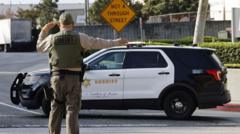Protests escalated in Los Angeles in response to immigration raids, leading to the deployment of National Guard troops as local officials clash with federal authorities.
Tensions Rise in Los Angeles Amid Immigration Raids and Protests

Tensions Rise in Los Angeles Amid Immigration Raids and Protests
National Guard troops deployed as protests erupt over recent immigration enforcement actions in California.
Despite efforts to quell dissent, tensions intensified yesterday in Los Angeles as protests erupted in response to recent immigration raids. In a controversial move, President Trump ordered the deployment of at least 2,000 National Guard troops to the city, with around 300 already on the ground and more en route. Law enforcement utilized crowd control measures, including tear gas, against protesters outside a local detention center.
California Governor Gavin Newsom condemned the federal government's maneuvers as a "serious breach of state sovereignty," asserting that the use of the National Guard was deployed without his authorization. He characterized Trump's actions as inflammatory and a deliberate provocation against California, a state that strongly opposes his immigration policies.
As tensions rise further, these protests mark a significant standoff between federal and state officials over immigration enforcement, which has become a central issue in national politics. The demonstrations originated in downtown Los Angeles and quickly spread to surrounding areas, including Paramount, where a substantial Latino community resides.
This clash is not just a local issue; it ties into larger dialogues about immigration policy and civil rights, as communities fear being targeted in upcoming federal actions. Many are concerned about the potential implications for the upcoming World Cup, where soccer fans may become unintended victims of immigration raids.
The events unfolding are indicative of a polarized political landscape in America, as the conflict suggests an ongoing struggle between state responses to federal policies and the ramifications for affected communities.
California Governor Gavin Newsom condemned the federal government's maneuvers as a "serious breach of state sovereignty," asserting that the use of the National Guard was deployed without his authorization. He characterized Trump's actions as inflammatory and a deliberate provocation against California, a state that strongly opposes his immigration policies.
As tensions rise further, these protests mark a significant standoff between federal and state officials over immigration enforcement, which has become a central issue in national politics. The demonstrations originated in downtown Los Angeles and quickly spread to surrounding areas, including Paramount, where a substantial Latino community resides.
This clash is not just a local issue; it ties into larger dialogues about immigration policy and civil rights, as communities fear being targeted in upcoming federal actions. Many are concerned about the potential implications for the upcoming World Cup, where soccer fans may become unintended victims of immigration raids.
The events unfolding are indicative of a polarized political landscape in America, as the conflict suggests an ongoing struggle between state responses to federal policies and the ramifications for affected communities.




















